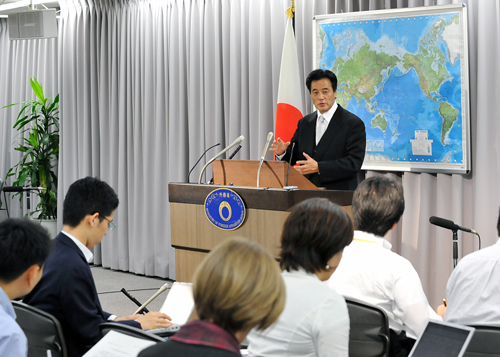
Minister for Foreign Affairs Okada addressing a inaugural press conference (September 17, Ministry of Foreign Affairs, Tokyo)
3. |
Providing Information to the Public and the Internationalization of Japanese Society and Local Regions |
In implementing foreign policies, it is essential to gain understanding and support from the public. To do this, it is important to give timely and lucid explanations about such subjects as the specific contents of foreign policies and the roles of the Ministry of Foreign Affairs. To that end, the Ministry strives to communicate accurate information through various media, including newspapers, TV, and the Internet.
In addition to daily press conferences held by the Foreign Minister, Vice Foreign Minister, Press Secretary and others, statements by the Foreign Minister and Press Secretary as well as press releases are made available to the public. Since September 29th, press conferences given by the Foreign Minister and other high ranking officials have become open to all media types including the Internet media and freelance journalists. In addition to these means of information transmission, the Ministry�s three political-level appointees led by the Foreign Minister appear on TV and in other media as much as possible to communicate Japan�s foreign policies directly to the public.

Minister for Foreign Affairs Okada addressing a inaugural press conference (September 17, Ministry of Foreign Affairs, Tokyo) |
The Ministry also provides and enhances information in an accurate, speedy and lucid way through its website (http://www.mofa.go.jp/). In 2009, the Ministry set up its own channel on the video sharing website YouTube. Through these steps, the Ministry tries to provide information in ways that the public can easily recognize. The Ministry also exerts efforts to transmit information overseas by providing information in English on its website and in other local languages on the websites of Japanese diplomatic missions in the countries where those languages are spoken.
Another step that the Ministry is taking is �public relations based on dialogue with the people.� Specifically, the Ministry holds the Foreign Minister�s lectures designed to explain to the public its policies and other topics in an easy-to-understand way, with the aid of visual images, sign language interpreters, etc. The Ministry also pays attention to take sufficient time for Q&A sessions following the lectures. Efforts to familiarize the public with the Ministry�s activities in face-to-face settings include lectures at universities and high schools and outreach lectures concerning ODA given by the Ministry�s officials. The Ministry is also working to improve two-way communication with the public by gathering comments and opinions through its website and by conducting questionnaire surveys.
To fulfill its accountability to the public, the Ministry discloses relevant information while paying close consideration to its trust-based relationships with other countries. In addition to pre-war diplomatic records, post-war diplomatic documents more than 30 years old are disclosed in series at the Diplomatic Record Office.
Local governments and communities play substantial roles in building sound international relations in a wide range of areas. In recent years, local governments, organizations and citizens are actively engaged in diverse activities that earn high recognition in the international community. In view of promoting international mutual understanding, building trust-based relationships and strengthening the power of the Japan brand, local governments and communities are acting as enormously important diplomatic players.
Based on this understanding, the Ministry regards local governments and communities as major partners in promoting diplomacy and aims to work with them to direct all-Japan efforts toward enhancing the country�s comprehensive diplomatic capacity. To achieve these goals, the Ministry implements various cooperative measures with local governments and other concerned parties, placing particular emphasis on 1) strengthening information sharing and communication, 2) working with local governments and communities to promote major diplomatic policies, and 3) extending cooperation toward international measures taken by local communities. Through these steps, the Ministry hopes to help revitalize local regions and solve problems facing local governments and communities.
Measures to better handle the increase of foreign nationals entering Japan and/or residing in Japan are also important. In 2008, the number of foreigners entering Japan reached approximately 9.15 million, twice as many as in 1998 (approx. 4.56 million). The number of foreigners staying in Japan for a long period of time (registered foreigners) rose sharply to approximately 2.21 million by the end of 2008, some 1.5 times as many as in 1998 (approx. 1.51 million).
In principle, foreign nationals entering the territory of Japan are required to possess appropriate visas to confirm their eligibility to enter the country. The Ministry however, has agreed to exempt visas for those who wish to enter Japan on business or pleasure with no probable harm in entering and also expedite the visa application process given that the increasing number of foreign nationals entering Japan. Meanwhile, the Ministry is conducting stringent screening when illegal employment and human rights violations involving foreign nationals are suspected. In light of a visas for economically stable Chinese individuals since July 2009.
Due to the increasing number of long-stay foreign nationals in Japan, various challenges emerge such as education, employment and housing. The Ministry co-hosted the International Symposium with Aichi Prefectural Government and the International Organization for Migration (IOM) in February with the aim of raising awareness of these issues mentioned above regarding foreign residents in Japan.